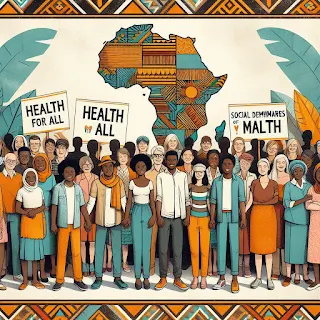Search This Blog
Welcome to Purpose Beyond Limits! We are more than just a brand; we are a centre built on four powerful pillars: 1. Purpose - providing you with a clear drive for something greater. 2. Belonging - creating a space where you are seen, valued, and accepted. 3. Storytelling - helping you own and share your unique story with the world. 4. Transcending limits - equipping you to identify your limits, rise above them, and live boldly. Building a global community without limits!
Featured Posts
- Get link
- X
- Other Apps
Exploring Social Health Interventions: Lessons for Zambia
.jpeg)
Purpose Beyond Limits
Date: 29 August
Author: Victor Mushimbami
Introduction
In a world where health disparities often define the quality of life, addressing social determinants of health can significantly impact communities. At Purpose Beyond Limits, we believe that understanding and adapting successful health interventions is essential for achieving equitable health outcomes. This post examines health initiatives from Brazil and South Africa, discussing how these models could inspire similar success in Zambia.
Brazil's Bolsa Familia Program
Brazil’s Bolsa Familia program is an example of addressing poverty and inequality through conditional cash transfers. Families received support contingent upon their children attending school and receiving regular health check-ups, improving both poverty levels and health outcomes (WHO, 2015).
South Africa's National Health Insurance Program
South Africa’s National Health Insurance (NHI) initiative aimed to provide universal healthcare access, reducing health inequities across populations (WHO, 2015). This model showcases how policy-driven health access can create a more equitable healthcare system.
Applicability in Zambia
Conditional Cash Transfers: Implementing a program similar to Bolsa Familia in rural Zambia could address poverty and healthcare access, particularly by encouraging educational attainment and preventive health practices.
Universal Health Access: Establishing a national health insurance system could enhance healthcare accessibility for underserved populations in Zambia, drawing inspiration from South Africa's approach.
Limitations and Considerations
Government Support and Funding: Both programs depend heavily on government commitment and sustainable funding, essential elements for Zambia to consider.
Community-Specific Factors: Understanding local health dynamics is crucial for effective intervention. According to health psychology insights by Dickerson and Mycek (2007), interventions should be sensitive to individual and community needs. Furthermore, Glasgow and Estabrooks (2018) recommend applying the RE-AIM framework to assess intervention success.
Implementation Steps for Zambia
- Collaboration with Stakeholders: Partnering with the government, Ministry of Health, and local organizations will ensure that these programs align with Zambia’s health priorities.
- Needs Assessment: Conducting a thorough needs assessment will help tailor programs to Zambia's unique requirements.
- Monitoring and Evaluation: A structured evaluation framework will track program success and inform improvements.
- Community Engagement: Actively involving communities in program development fosters trust, relevance, and sustained impact.
Conclusion
Adapting successful health initiatives like those from Brazil and South Africa can help Zambia address key social determinants of health. At Purpose Beyond Limits, we support Zambia’s journey towards equitable health for all by sharing these insights and fostering collaboration among stakeholders.
Call to Action
How can Zambia improve healthcare access and reduce disparities? Share your insights in the comments! Don’t forget to subscribe to Purpose Beyond Limits for more discussions on impactful health initiatives.
References
World Health Organization. (2015). World conference on social determinants of health : Case studies on social determinants of health. WHO. Retrieved from. https://my.uopeople.edu/pluginfile.php/1865010/mod_book/chapter/515717/Social%20Health%20Determinants.pdf
Dickerson, S. S., & Mycek, P. J. (2007). Health psychology. Encyclopedia of Social Psychology 1, 415-419. SAGE Publications. Retrieved from. https://my.uopeople.edu/pluginfile.php/1865006/mod_book/chapter/515710/Health%20Psychology.pdf
Glasgow, R. E., & Estabrooks, P. E. (2018). Pragmatic applications of RE-AIM for health care initiatives in community and clinical settings. CDC.gov. Retrieved from. https://doi.org/10.5888/pcd15.170271
- Get link
- X
- Other Apps
Comments
Post a Comment
We love to learn from both negative and positive feedback! Please share your thoughts on this post, as we value all perspectives. Keeping an open mind is essential to our growth, so feel free to share your insights, experiences, or questions. Remember to keep your comments respectful and relevant. Constructive feedback is always welcome! Join the conversation and connect with other readers!